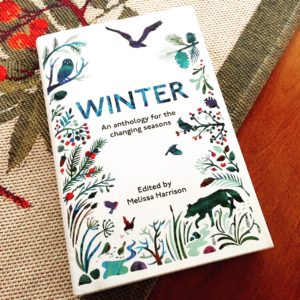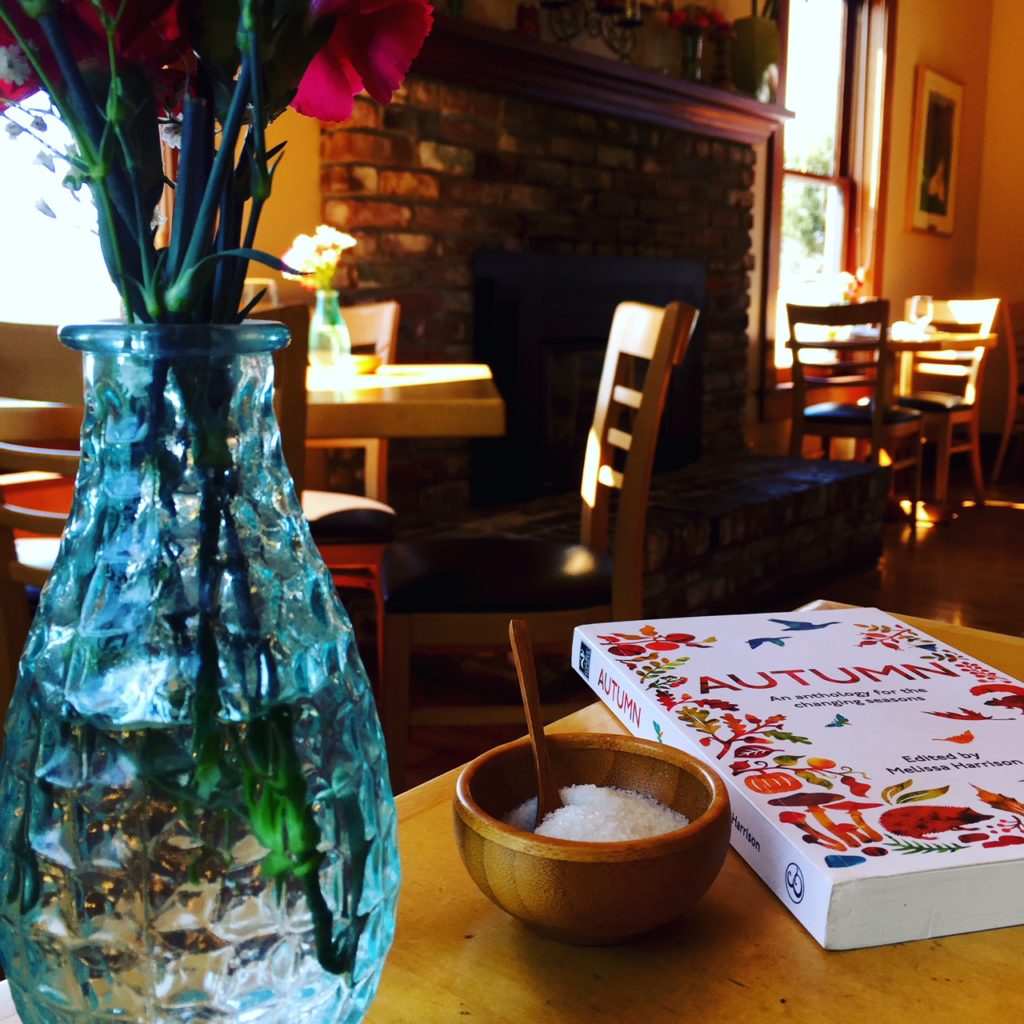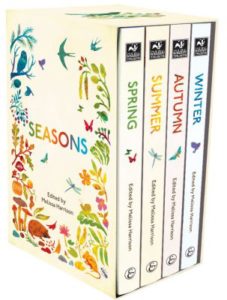As those who follow The Well-read Naturalist’s Twitter or Instagram feeds will likely already know, I make a regular habit of reading from the collected essays in Melissa Harrison’s Seasons quartet of anthologies from Elliott & Thompson. However what you may not know is just how regular this habit is, or why I do it. It’s easy enough to assume that I find the essays, poems, and diary extracts enjoyable and inspiring; Ms. Harrison’s exquisite editorial taste assures that nothing less that some of the finest nature-themed prose and verse available in the English language would have been included. However even more than these collections being superb assemblies of writings about nature, in them I have found something more than I originally expected that has been of deep and lasting value to me, for which I am deeply grateful to all those whose works are included as well as to their remarkable editor. Thinking that they may well perhaps be of similar help to others as they have been to me, I take somewhat of a personal risk by explaining it here.
I read the Seasons volumes according to their namesakes. However after the first year of doing so according to the modern calendar, I made a change and shifted to a more traditional one. Thus I now take up my reading from the Autumn volume at Lughnasadh, the Winter volume at Samhain, and so forth, which places me in the middle of each one for such solar festivals as Litha at proper midsummer and at Yule in midwinter.
Each day upon arising, right after I make a pot of tea and while the rest of my family is still a-bed, I settle into my chair and take up a new entry in the present season’s volume, following their arrangement in the book just as each day follows the next deeper into the season (Ms. Harrison has arranged them such so that read in this way they naturally follow the season’s progress). And while I must admit that I began doing this as something of an act of resistance to the daily ugliness that 2017 brought so many of us, the practice has blossomed into something a bit more complex and personal than anticipated.
 I have long turned to nature for solace and healing. From the time I was a boy, no matter how badly I was bullied at school that day (and some days it was downright vicious), the forest behind our house always received me warmly when I returned home. Taking to the fields, the hills, the shoreline, or the deep shadows of the forest has to this day been my remedy for whatever life throws at me – the difference now being that over the years I have discovered in these places not only solace, safety, and security, but spaces for celebration and joyfulness as well.
I have long turned to nature for solace and healing. From the time I was a boy, no matter how badly I was bullied at school that day (and some days it was downright vicious), the forest behind our house always received me warmly when I returned home. Taking to the fields, the hills, the shoreline, or the deep shadows of the forest has to this day been my remedy for whatever life throws at me – the difference now being that over the years I have discovered in these places not only solace, safety, and security, but spaces for celebration and joyfulness as well.
Indeed, and please don’t think ill of me for what I’m about to disclose, but some years ago, failing to find sufficient relevance to my life in the teachings of the Christianity in which I had been raised, I apostatized and looked toward that which had for so long already been providing to me the solace, the wisdom, the comfort, the inspiration, and the guidance that so many people ascribe to their own spiritual practices. However I didn’t so much put my faith in nature as I found it there. Putting my hand to the rough bark of a Douglas Fir, feeling the wind blowing in from the Pacific Ocean, or gazing upon the face of the Moon in the night sky, I found much more meaning than I ever did sitting in any church pew or reading from any canonical scripture, even those I have found particularly wise (Proverbs) or poetically beautiful (Ecclesiastes). Yet please don’t think I have put such wise collections as these aside – I have merely, shall we say “re-ordered” them in relation to other, decidedly non-canonical sources in which I seek understanding and inspiration.
In addition to the love of my family, it has been my experiences with nature that have seen me through my treatments for cancer and hemochromatosis, the loss of jobs, the death of my father, the deterioration and disappearance of my mother, the rise of political authoritarianism in my natal country, and most recently, upon turning fifty, the realization that some dreams may never come. It has also been in nature that I have found comfort during long business trips that put hundreds and even thousands of miles between those I love and myself.
 Which brings me back to these superb anthologies. As I am frequently called upon to travel as part of my present work – sometimes to places very much isolated from nature in any but a very minimized or highly disturbed form (Las Vegas, for example) – it is not always possible for me to feel myself connected to nature as meaningfully as I would like to feel. It is, however, possible for me always to have one of these volumes in my bag. Similarly, as a husband, parent, and care-giving son, there are days when, even being home, my life is so filled with responsibilities that it’s all I can do to see to the day’s tasks. However there is, in the precious pre-dawn moments when the house is still quiet, time enough to read in one of the quartet’s volumes a poem, a snippet from a diary, or a two-or-three page essay reminding me that all I have ever experienced of the natural word still abides, and that others have felt its magic every bit as deeply as I have. Thus these volumes have become for me, if you will, a daily devotional.
Which brings me back to these superb anthologies. As I am frequently called upon to travel as part of my present work – sometimes to places very much isolated from nature in any but a very minimized or highly disturbed form (Las Vegas, for example) – it is not always possible for me to feel myself connected to nature as meaningfully as I would like to feel. It is, however, possible for me always to have one of these volumes in my bag. Similarly, as a husband, parent, and care-giving son, there are days when, even being home, my life is so filled with responsibilities that it’s all I can do to see to the day’s tasks. However there is, in the precious pre-dawn moments when the house is still quiet, time enough to read in one of the quartet’s volumes a poem, a snippet from a diary, or a two-or-three page essay reminding me that all I have ever experienced of the natural word still abides, and that others have felt its magic every bit as deeply as I have. Thus these volumes have become for me, if you will, a daily devotional.
 Therefore I would like to recommend that everyone – particularly those who may, like me, feel that the human world has taken a turn for not only the worse but straight into the bloody awful – secure one, or preferably all four, of these truly remarkable anthologies. Take up the volume for the present season and read one entry each day. Do this every day, and see if it doesn’t help to ground you in remembering that no matter what might be heard on the radio or read in the newspaper, regardless of how many challenges you might be asked to face and overcome that day, that nature – all-encompassing Nature – persists. She (to use the pronoun I prefer to use in reference) is larger than diseases. She is stronger than politicians. She is greater than nations. She is older than our puny species, and will endure long after we have finally returned to her embrace.
Therefore I would like to recommend that everyone – particularly those who may, like me, feel that the human world has taken a turn for not only the worse but straight into the bloody awful – secure one, or preferably all four, of these truly remarkable anthologies. Take up the volume for the present season and read one entry each day. Do this every day, and see if it doesn’t help to ground you in remembering that no matter what might be heard on the radio or read in the newspaper, regardless of how many challenges you might be asked to face and overcome that day, that nature – all-encompassing Nature – persists. She (to use the pronoun I prefer to use in reference) is larger than diseases. She is stronger than politicians. She is greater than nations. She is older than our puny species, and will endure long after we have finally returned to her embrace.
In the words of others whom I have met who seem to follow a similar path to the one I have now for some time, knowingly or unknowingly, followed, “so mote it be.”
Available from:
If you enjoyed reading this, please consider signing up for The Well-read Naturalist's newsletter. You'll receive a helpful list of recently published reviews, short essays, and notes about books in your e-mail inbox once each fortnight.

